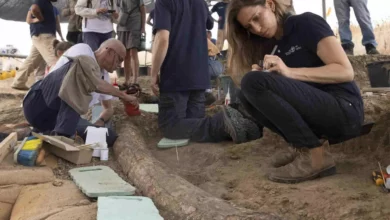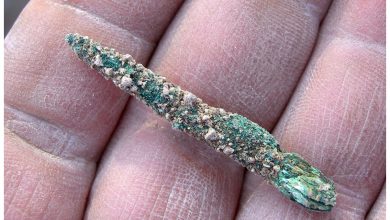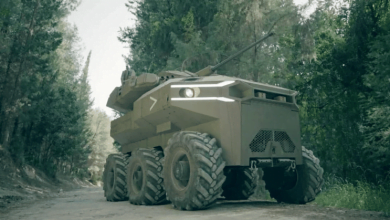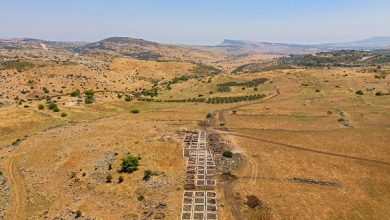
Israeli air strikes on Gaza after launching incendiary balloons from the Strip
(ORDO NEWS) — Israeli warplanes launched air raids on Gaza at dawn on Sunday after launching incendiary balloons on Israeli territory from the Palestinian sector, a day after clashes that wounded 11 Palestinians at the border fence.
The Israeli army said in a statement that “the raids targeted a Hamas military compound used for manufacturing weapons and training, as well as the entrance to a terrorist tunnel adjacent to Jabalya.”
The statement added that “the strikes came in response to Hamas’ launch of incendiary balloons on (Israeli) lands and the violent riots that occurred yesterday” Saturday.
The escalation came two days after Israel announced a set of facilities for the Gaza Strip, including the reopening of the Rafah crossing, the entry of goods and other economic measures.
On Saturday evening, clashes erupted between the Israeli army and Palestinians who responded to the call of a number of Palestinian factions in Gaza to protest, especially against the siege imposed by Israel for nearly 15 years on the densely populated sector.
During the clashes that took place at the border fence separating the Strip and Israel, the Israeli army used tear gas and stun grenades, while demonstrators burned tires, according to an AFP journalist.
The Gaza Ministry of Health stated that 11 Palestinians were wounded in the clashes on Saturday evening, including three who were wounded by live bullets.
- Accusations exchanged -
Israeli Prime Minister Naftali Bennett blamed the Islamic Resistance Movement (Hamas), which controls the Gaza Strip, for any unrest in the Strip. “As I said earlier, our measures in Gaza will serve our interests,” he told reporters before leaving Washington for Israel. “For me, the party (responsible) was and still is Hamas,” he added.
In the Gaza Strip, Hamas blamed “the Zionist occupation for all the repercussions and consequences of the siege on Gaza and the escalation of the humanitarian crisis among its residents.” The movement indicated in a statement published by its spokesman, Fawzi Barhoum, that the “extremist Israeli policies will push strongly towards creating an atmosphere of escalation and explosion.”
The Jewish state usually holds Hamas responsible for all actions targeting its lands from the Palestinian enclave.
Last May, Israel and Hamas fought a lightning war that lasted 11 days, in which 260 Palestinians, including 66 children and fighters, were killed in Israeli strikes on Gaza, according to local authorities.
Palestinian factions, in turn, fired thousands of rockets at Israel during the war, killing 13 people, including a soldier, a girl and a child.
- Rafah crossing opened in both directions -
On Sunday, the Egyptian authorities reopened the Rafah border crossing with the Gaza Strip in both directions, after opening it on Thursday from one direction for the return of stranded people and the entry of goods.
Egypt closed the crossing, which is the only outlet for about two million people living in the Gaza Strip, last Sunday because of what it said was a “technical defect.”
However, Palestinian sources in Gaza indicated that its closure was “an expression of Egypt’s protest against the confrontations that Gaza’s borders with Israel witnessed” the day before.
Israel announced special economic measures in the Gaza Strip “after assessing the security situation”, which went into effect on Thursday.
These measures included expanding the entry of equipment and goods for international civil projects and the private sector, approving the import of new vehicles, and allowing the gold trade between the Strip and the West Bank.
The facilities also included allowing an additional 1,000 Palestinian merchants from Gaza to cross from the Strip to the Jewish state.
For their part, Israeli firefighters said that incendiary balloons launched Saturday from Gaza caused wildfires in Israel.
And about forty people were wounded last Saturday by Israeli fire, according to the Gaza authorities, including Omar Hassan Abu al-Nil, the Palestinian boy who died on Saturday.
On Wednesday, the Ministry of Health in the Gaza Strip announced the death of Osama Edeij, 32, from injuries he sustained on Saturday.
In those protests, a member of the Israeli security forces was wounded by bullets, and he is still in a critical condition.
Weekly gatherings known as “return marches” were organized since March 2018 for more than a year near the border fence between Israel and the Gaza Strip to demand an end to the siege and the “right of return” for Palestinians who fled or were expelled from their homes when the state of Israel was established in 1948.
About 350 Palestinians were killed by Israeli soldiers at that time.
—
Online:
Contact us: [email protected]
Our Standards, Terms of Use: Standard Terms And Conditions.









